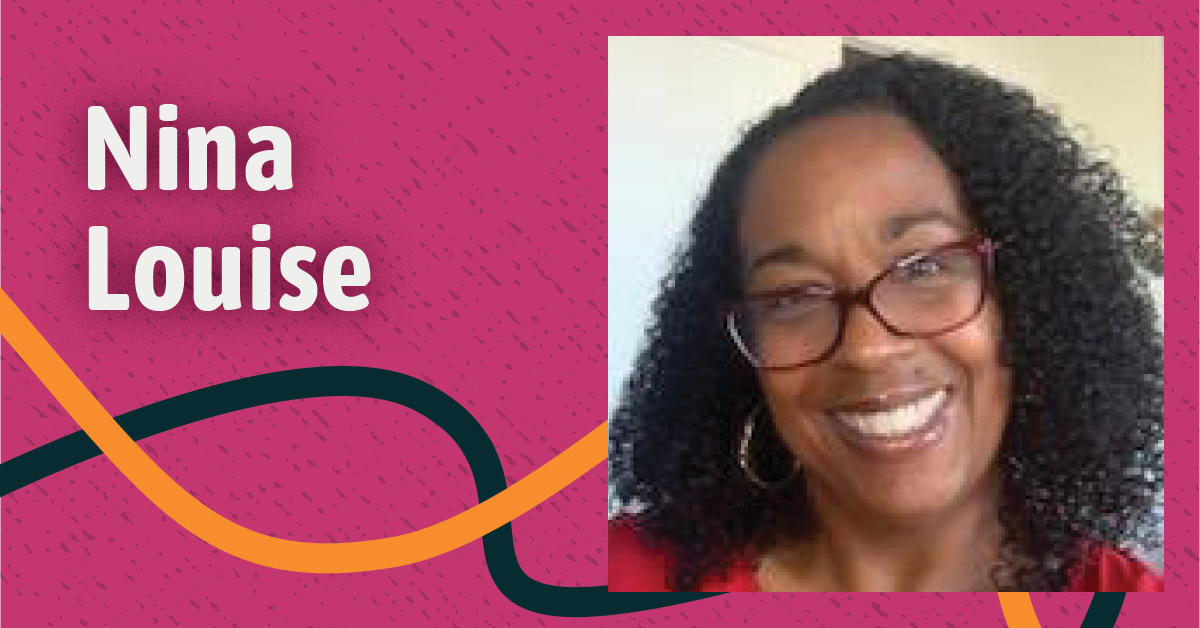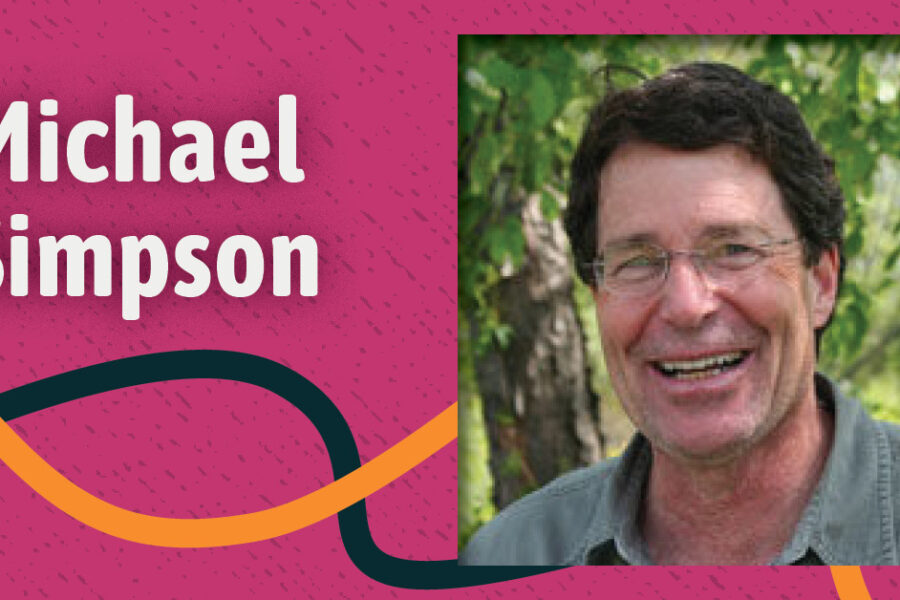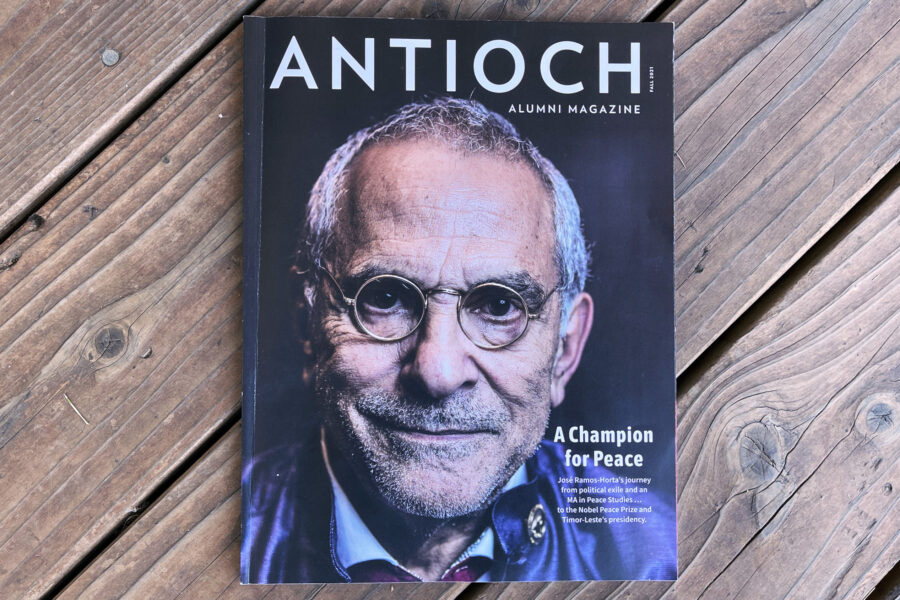We recently caught up with Nina Louise, a writer and scholar exploring the intersection of Black and Asian cultures. After graduating from the Undergraduate Studies program at Antioch in Los Angeles, Louise is now studying for a PhD at the University of Hawaiʻi at Mānoa. Her writing can be found on the Little Tokyo Historical Society website, and this spring she is publishing her first novel, The Sea of Dead Souls. Louise recently returned to Antioch to share an excerpt at the latest Literary Uprising, and we took the opportunity to ask her five questions. Read on to learn about her experiences as an undergraduate student at Antioch, why she finds historical fiction fascinating, and her research into Black and Asian cultures in the United States.
Nina, why did you choose to study creative writing as part of your BA at Antioch and how did your degree help you get to where you are now?
Creative writing is in my blood and had been since I was eleven years old and given a diary for my birthday. In that diary I never wrote about what happened to me on the daily, like girls do. Instead, I wrote stories, characters, who looked like me I wanted to see in shows that I loved. So, I added a next-door neighbor to Nancy Drew who helped her solve neighborhood crimes and a Black Charlie’s Angels. But Charlie’s Angels was ahead of the game and brought in Jayne Kennedy for an occasional episode. What an enormous boost to my self-esteem when she joined the angels.
As I have a million stories I want to tell and had been writing for years, I was not completing work, and I knew it had a great deal to do with my lack of confidence as a writer and how I was telling the story. Basically, I knew I needed training, workshops and to learn from the best. I felt blessed to get into Antioch. I had reapplied to the University of La Verne where I went straight out of high school, but because I left with such a low GPA, they wanted me to attend community college and then reapply. When I came across Antioch and realized it was just down the street from where I lived, I had to go for it and I did. I had never been so grateful for a second chance in all my life. After a thirty-year hiatus from college, I returned and am happy to say my GPA improved far above my expectations.
Had they not accepted me to Antioch, I would definitely not be where I am today. Once I received my degree, I knew I needed to continue my education not just because I wanted to see my writing excel, but I wanted to know if I had it in me to teach others what I have learned. I only applied to two master’s in English programs, and Loyola Marymount University had everything I was looking for to continue where I left off at Antioch. Landing at the University of Hawaiʻi at Mānoa for my PhD program in English felt like another blessing.
I applied during the pandemic because I wanted to go to Japan and teach English for a year or two, and hang out with my niece and nephew who live in Okinawa, and write at beaches until my next mission inspired me. Without having a clue what to do or where I could go during the pandemic, I decided to see if more schooling was meant for me. I applied to several MFA Creative Writing programs, UC Irvine, USC, because I wanted to learn from the best. But I also wanted to return home to Hawaii. So I applied, and thank goodness I got in.
Can you share any memorable stories about your time at Antioch?
There are so many significant memories from Antioch. What I remember most are my instructors, Deborah A. Lott and Rob Fox, who were gifts from God to me. They nurtured my writing and challenged me to dig deep and to go to those scary places that sometimes, as writers, we don’t want to go, but know it will only enhance our writing. The ‘Lit Up’ series in which I volunteered my services during my program at Antioch was the best highlight for me as a writer. I could meet writers debuting their writing careers, watch them read, meet and network with the local community of artists. It was a very exciting experience.
Tell us a little bit about your upcoming novella, The Sea of Dead Souls. What is it about? And why are you drawn to historical fiction?
Sure. I love talking about my upcoming novella. There is the elevator pitch or the standard summary, I will attempt to combine them. What is great about this little book is it was a writing project for my novella class during my last semester with LMU. And it is the prequel of my capstone project, which is a historical fiction novel about southern migrants flooding into Little Tokyo in Los Angeles during WWII and the Japanese Internment called We Were Once Here & Then We Were Gone.
This novella, The Sea of Dead Souls, is the story of Naomi Gatson and her family’s attempt to flee their farm in Shreveport, Louisiana, for a better life in the north. However, an obsessed and vindictive local sheriff will stop at nothing to keep them from leaving. Through my research in the novel I discovered it was not only Jim Crow laws or the Black Codes that kept Blacks from moving up and forward with their lives, but sometimes it was their neighbors, their friends, and sometimes even family who kept them from fleeing north. Blacks in the south were punished if they stayed and punished if they tried to leave. For some, it was a life or death situation and fortunately, as we now know, many made it out to thriving cities in the North.
I am drawn to historical fiction, as I believe there are many stories to be discovered. I find it fascinating that we have a rich history of coalition among various cultural backgrounds, but Blacks and Asians have been pitted against one another for decades and to discover areas when these two groups worked together, lived together, loved together, to improve their lives and work for a better America, since the Emancipation Proclamation to the Civil Rights Movement, can speak to our present and future allyships.
What is the focus of your doctoral research at the University of Hawaii?
I am very curious about the past relationships between African Americans, Asians, and Asian Americans from our history. I have heard stories that pique my interests, and I need to know more. My capstone from LMU was supposed to be a short story, but when I met the committee of The Little Tokyo Historical Society, a member told me how Little Tokyo in Los Angeles was once Bronzeville, an almost all-Black community during the Japanese internment. They came for war and industrial jobs. The opportunity to find work outside of domestic labor was tremendous. I knew there was a story there, and discovering the amazing jazz clubs and breakfast clubs that rose from that era was just as fascinating.
Here in Hawaii, I had intended to pursue my next historical fiction novel around the reconstruction era, right after the Emancipation Proclamation, when southern states recruited Chinese immigrants to come and work the plantations alongside former slaves who stayed and worked. I discovered nearly 40% of Chinese men married Black women in Mississippi during this time, as the Chinese Exclusion Act of 1882 kept Asian women from entering America. But with travel up in the air, Mississippi and Hong Kong are slim possibilities. But as a researcher of Black history in America, in Hawaii, I have found a few other leads, such as Carlotta Stewart Lai or Alice Ball, that could make it an Oprah’s Book Club selection one day.
We’re excited that you returned to Antioch to read at Literary Uprising! Tell us about the connections you have maintained with Antioch since graduating.
Alistair McCartney has been a wonderful mentor and contact from Antioch. He has gone above and beyond to help advance my writing and academic career. I still keep in touch with some professors and former classmates. My fellow Antioch writers and I formed a writing workshop which produced an online literary magazine for Antioch alums, Sentience Literary Journal with issue two coming soon. These friendships have guided my career and writing in more ways than I could ever imagine, and I am so grateful for Antioch Los Angeles and everything they taught me.
(Learn more about Nina Louise by visiting her website, ninalouise.net)




